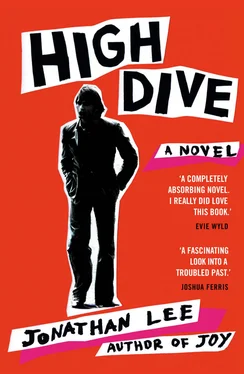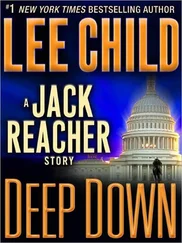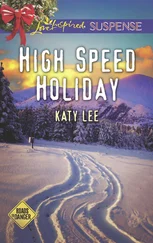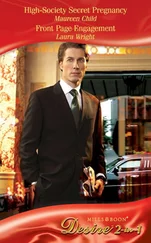‘The eighth wonder of the world,’ he was saying now. The tatty leather elbow patches on his red jacket squeaked against the bar as he shuffled on his stool. Freya assumed he was talking about his museum, or reciting a crossword clue, but she was wrong. He was referring to Marina. She entered the bar area pink-cheeked, pneumatic, holding a dusty lidless plastic box topped with crayons and Lego. The card players at the table to the left became tremulous of eyebrow and low of voice. The Captain cracked his fingers. A silver pendant bobbed helplessly on the swell of her breasts. An unusually low-cut little number. Lately Freya had felt herself slipping into a rivalry of delicate dimensions.
‘Freya, darling, do you mind if I leave this box behind the bar?’
She shrugged. ‘We’ve got kids staying?’
‘No, it’s my little nephew. My sister is ill. I’ve got him with me later today.’
‘I didn’t realise you had a sister.’
‘Seven,’ Marina admitted.
‘You’ve got seven sisters?’
‘Y e s. And one brother. But he adds nothing.’
‘Zone Three,’ the Captain said, tapping his knuckles three times on the bar.
‘I’m sorry?’ Marina said.
‘Seven Sisters. Between Finsbury Park and Tottenham Hale, in Zone Three, if I’m not mistaken. London Underground. Also a term to describe a loosely linked collective of Stalinist skyscrapers in Moscow. Yes, an unusual combination of Russian baroque and Gothic. Saw a couple of them after the war.’
Marina, rarely flustered, looked flustered. It was interesting to observe. She blinked and gave the Captain a quick strategic smile. ‘See you soon!’ she sang.
‘When you say “during the war”,’ Freya said, ‘which war was that, Captain?’
The Captain coughed.
She looked at the Walkers Crisps order form in front of her. A little job left by John. How was she supposed to know what flavour crisps Conservatives preferred? In his Memos With The Bad Puns In The First Paragraph, the GM kept telling everyone to ‘bolster supplies’ and be ‘ready for anything’. He made it sound like they were going to war. It was the most boring war she’d ever been involved with.
She was hungry. The Captain reached into a jacket pocket. He pulled out a yo-yo and a curled Post-it note. The Captain’s pockets were renowned throughout Brighton as sinkholes of buried treasure and sedimented knowledge. In pub quizzes at the Cricketers he was on occasion asked to leave his jacket behind the bar. There was a fear that the weight of encyclopedic wisdom lurking in its various compartments might tempt him to cheat (or, as the Captain himself put it, fleece, hose, bilk, diddle, rook, gyp, finagle, cozen, swindle, hornswoggle, flimflam). He pressed the Post-it note onto a London Pride beer mat, wrote something on it with a biro borrowed from Freya, and then put the note and the biro in his pocket.
‘Um, I kind of need that pen?’
He pushed the yo-yo in her direction. ‘Swapsie?’
Why not. This was the new Freya. Yo-yoing. Impulsive. Soon-to-get-a-cool-boyfriend-whose-skin-wasn’t-scorched-by-Clearasil. She took the yellow yo-yo and tucked her middle finger into the loop of string. With a backward flick of her hand she sent it down towards the ground. Instead of whirring back up the thing left its string, hit the floor with a clack , and rolled away.
‘The Games section of my museum is getting unwieldy,’ the Captain explained.
She’d liked Blatchington Mill. She had been OK at all the sports. The school had a reputation for being rough, but that reputation was spread by people who unfairly compared it to St Catherine’s. St Catherine’s was, as everyone knew, the kind of top-notch penitentiary where students took home the BBC Songs of Praise Choir of the Year trophy three years running. She made herself another lime and soda and gave the Captain another bowl of nuts. When the nuts had gone the Captain looked up.
‘Are you going to come by tomorrow, Freya? To the museum?’ He appeared to have retrieved the yo-yo from the floor. With surprisingly nimble fingers he was reattaching it to the string.
Maybe, she told him. It was a genuine maybe. There had been a time when she’d wondered if he might be a bit creepy, but that had given way to a sense that he was one of the more interesting people she knew. She suggested two thirty.
‘Too bad,’ the Captain said. ‘Two fifteen tomorrow I plan to be at St Paul’s. A man without a schedule may as well be dead.’
‘I didn’t know you were religious.’
‘I am interested in fictions of all sorts,’ he said. ‘Novels. Poems. Stories. Tales politicians tell. I’ve never found much that’s fruitful in straight-faced facts. I don’t enjoy them, you know? Can’t make myself believe in them. Second-hand is what they are, they lack the raw stuff of absurdity, and people make the mistake of trying to be all-serious, as if life isn’t funny, or all-funny as if life isn’t serious. You can only get at the world if you do both. Life’s a tune that accommodates a great many tones. Of course —’ he yawned — ‘most people are desperate bores. Lucian Freud once said to me — I know him a little, not to name-drop, and he once said to me this — he said, “Captain, sometimes painting is like one of those recipes where you do all manner of elaborate things to a duck, and then end up putting the duck to one side and only using the skin.”’ The Captain slapped the bar and laughed. ‘Good old Lucy! Terrible hunger for flesh, but … Life’s the things people keep, the things they throw away. Here, good as new. I’ve lost my train of thought.’
She took the yo-yo. ‘Who’s Lucian Freud?’
‘Prolific is what he is. You’re probably one of his love children.’
‘If he’s got money, that could be useful.’
‘I’ll put in a good word,’ the Captain said. ‘If you’re not going to galleries, keep up with your reading. I’ve been ploughing through some paraphernalia by this chap Joseph Mitchell. Know him? Bernard MacLaverty also. Not a better writer alive. If you read things, you have views on things. You never want to become one of those people who believe in nothing. It leads to the itsy-bitsy misery. A time to dance. I’m the second-greatest authority in the world today on the language of the seagull.’
She asked him if he wanted another drink. She thought it might bring some colour to the unwhiskered portions of his cheeks. Her idea of old people was that they should look a bit autumnal. Did the Captain ever eat a home-cooked meal? Did he ever sleep in a proper bed? Did he really know Lucian whatsit? She didn’t know; she had no idea. More mysteries, more hidden habits. More things pocketed within his private self.
He said no to another drink. ‘I’ll lose my senses,’ he explained. As he did so, a shape emerged in the lobby. The shape resolved itself into Roy Walsh.
She swallowed and tried to write a quick script in her head. Witty things to say. Interesting things. Where were they? He saw her and waved. Came towards the bar. ‘Nice to see you again,’ he said.
‘I thought you were …’
‘Yeah. Had to extend my stay.’
She asked him if he was staying because of work.
He shrugged and said, ‘What isn’t?’
‘Is your friend still with you?’
‘Friend?’
‘The guy on the stairs. He seemed —’
A smile. ‘Colleague. He had to leave, unfortunately.’
‘That’s a shame,’ she said. ‘I mean …’ she said, and gave up.
The Captain studied the wall. The card players stared at their cards.
‘Sorry,’ she said. ‘Captain, this is … well, he’s —’
‘Hi,’ Roy said, shaking the Captain’s hand.
Time got fat on silence. The Captain leapt to his feet with unlikely speed. He offered Freya a pound coin. He always offered a pound coin. It was his best and only offer. According to the Captain, if you proffered a pound coin in exchange for food and beverages and any other services rendered, it was a civil matter. Theft and a whole gambit of other criminal offences only came into play if you walked off without paying anything at all.
Читать дальше












